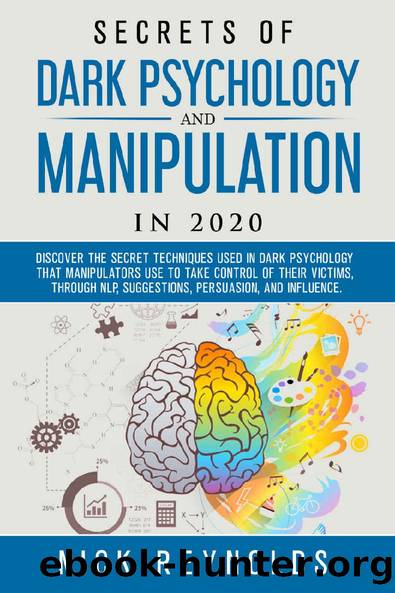Secrets of Dark Psychology and Manipulation in 2020 by Nick Reynolds

Author:Nick Reynolds [Reynolds, Nick]
Language: eng
Format: epub
Publisher: UNKNOWN
Published: 2020-10-06T00:00:00+00:00
Chapter 6:
Dark Persuasion
Some many methods and techniques are used every day to influence people to perform a specific action or change behavior. Dr. Robert Cialdini a professor in Psychology and Marketing at Arizona State University discovered
principles, that influence is based on six key reciprocity, commitment, consistency,
social proof, authority, liking, scarcity. Cialdini discovered that one of these principles were almost always in action when it comes to persuasion. Cialdini notices human basic behavior dictates that when we receive something we want to give something back as if we are paying back debts. We innately want to treat others as they treated us; it's a part of our primitive nature. This is what is considered as reciprocity, people by nature feel obligated to provide something in return because humans don't like to feel indebted to others. How manipulators use this principle is by offering something for free, you will see them doing favors to lure you in. After receiving these favours and freebies, humans will begin to develop a feeling of guilt and indebtedness to return something in exchange. If someone is trying to get something out of you, they will use this technique before they ask you for their favor, itâs almost considered as an ethical bribe.
In 1974 Dr. Phillip Kunz performed an experiment, which demonstrated a better understanding of reciprocity in action. Dr. Kunz was a Sociologist at Brigham Young University, he decided to experiment to see what people would do if they were to receive a Christmas card from a stranger. Dr. Kunz randomly selected 600 names from the directory, wrote their names on the cards, and mailed them out. To his surprise, he was receiving back 12 to 15 cards per day, totaling to more than 200 cards. What happened to Kunz was the direct result of the principle of reciprocity.
The second principle in Caldiniâs persuasion principle is a commitment, Caldini declares that human beings have a deep need to be consistent. Psychologists consider this as âBehavioral Consistencyâ, this is where we default to the same decision to make the process of making decisions easy. Human beings donât like to make different decisions every time they are faced with problems. In Cialdini's research, he found that people will do anything they can to behave consistently, which also drives a feeling of positivity, even when they are wrong. Once someone has taken a stand, they feel compelled to behave consistently with their commitment. If they have taken a side in an argument or have decided to venture on a journey, all their actions will justify their decisions. Letâs say they decided to become vegan for the new year, you will see them checking all their food items and clothes to be consistent with their decisions. They will feel a sense of pressure to keep the promise not only to themselves but also to the public eye. If we do not follow through with our decision, we will feel a sense of guilt especially if we are inconsistent with others.
Download
This site does not store any files on its server. We only index and link to content provided by other sites. Please contact the content providers to delete copyright contents if any and email us, we'll remove relevant links or contents immediately.
| Administration & Medicine Economics | Allied Health Professions |
| Basic Sciences | Dentistry |
| History | Medical Informatics |
| Medicine | Nursing |
| Pharmacology | Psychology |
| Research | Veterinary Medicine |
Bioenergetica by Alexander Lowen(1472)
The Child in You by Stefanie Stahl(1253)
No Bad Parts by Richard C. Schwartz(1236)
Noise: A Flaw in Human Judgment by Sunstein Cass R. & Sibony Olivier & Kahneman Daniel(1187)
The Data Detective by Tim Harford(1133)
Chatter by Ethan Kross(1061)
The Science of Rapid Skill Acquisition by Peter Hollins(918)
The Quantum Psychiatrist: From Zero to Zen Using Evidence-Based Solutions Beyond Medication and Therapy by Biswas Dona(874)
Freedom by Sebastian Junger(855)
The Montessori Baby by Simone Davies(849)
Maps of Meaning: The Architecture of Belief by Jordan B. Peterson(743)
The Science of Self-Learning: How to Teach Yourself Anything, Learn More in Less Time, and Direct Your Own Education (Learning how to Learn Book 1) by Peter Hollins(729)
Evolution Gone Wrong: The Curious Reasons Why Our Bodies Work by Alex Bezzerides(704)
Sadomasochism and the BDSM Community in the United States by Stephen K. Stein(688)
Anxiety For Dummies by Charles H. Elliott & Laura L. Smith(666)
Why Sex Doesn't Matter by Olivia Fane(660)
Disconnected by thomas Kersting(658)
Jung - The Key Ideas: Teach Yourself (TY Philosophy) by Ruth Snowden(628)
The Mechanics of Passions: Brain, Behaviour, and Society by Alain Ehrenberg(613)
